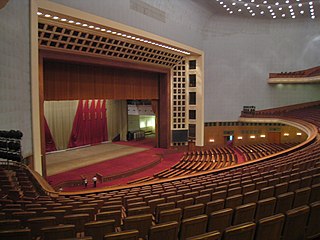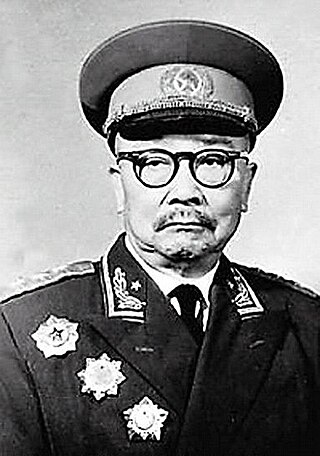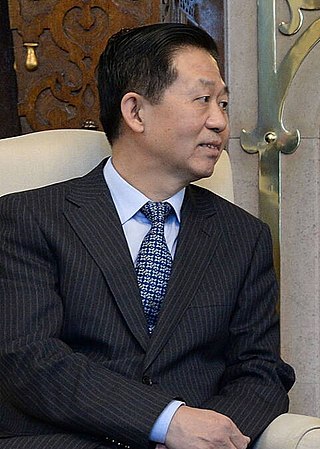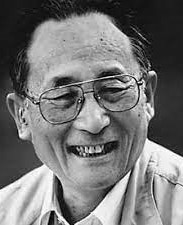
The 17th National Congress of the Chinese Communist Party was held in Beijing, China, at the Great Hall of the People from 15 to 21 October 2007. Congress marked a significant shift in the political direction of the country as CCP General Secretary Hu Jintao solidified his position of leadership. Hu's signature policy doctrine, the Scientific Development Concept, which aimed to create a "Socialist Harmonious Society" through egalitarian wealth distribution and concern for the country's less well-off, was enshrined into the Party Constitution. It was succeeded by the 18th National Congress of the Chinese Communist Party.

Li Kenong was a Chinese general and politician, one of the creators of the security and intelligence apparatus of both the Chinese Communist Party (CCP) and the People's Liberation Army. Notably, he served as Director of the Central Investigation Department, Deputy Chief of the PLA General Staff Department and Deputy Minister of Foreign Affairs and was awarded the rank of General in 1955.

Li Desheng was a general in the Chinese People's Liberation Army. He was born in Xin County, Henan, China, an area now known as the "Cradle of Generals" for the large number of senior military officers born in the region. He joined the Chinese Workers' and Peasants' Red Army at the age of 14, in 1930, the Communist Youth League in 1931, and the Chinese Communist Party a year later. He attained the rank of major general in 1955, and general in 1988. The patterns of Li's advancement suggest that he was mentored by Chen Xilian, and that he was closely aligned with You Taizhong. Li Desheng served on the Politburo of the Chinese Communist Party from 1969–1985, one of the most turbulent periods of the People's Republic. He died in Beijing on 8 May 2011.

Wei Wenbo was a Chinese Communist revolutionary and politician who played an extensive role in the building of China's legal system. He was also one of East China's most senior leaders before being purged in the Cultural Revolution.

Xiao Jie is a Chinese politician and an important political aide of Premier Li Keqiang. He served as a State Councilor and the Secretary General of the State Council from 2018 to 2023. Xiao served as the Minister of Finance from November 2016 to March 2018. He previously served as Deputy Secretary-General of the State Council and chief of staff of Premier Li Keqiang, and the deputy director of the State Council Leading Group for the Nationwide Economy Census. He had also served as the director of the State Administration of Taxation.

The Central Financial and Economic Affairs Commission is a commission of the Central Committee of the Chinese Communist Party in charge of leading and supervising economic work of both the CCP Central Committee and the State Council. The Commission is generally headed by CCP General Secretary or Premier of the State Council.

Li Hongzhong is a Chinese politician, who is currently the first-ranking vice chairperson of the Standing Committee of the National People's Congress and a member of the Politburo of the Chinese Communist Party.
Li Liguo is a Chinese politician. He served as the Minister of Civil Affairs between 2010 and 2016, and formerly served as Deputy Communist Party Secretary of the Tibet Autonomous Region, among other roles. He was investigated by the Central Commission for Discipline Inspection in late 2016, was assigned responsibility for corruption at the Ministry of Civil Affairs, and stripped of his post as minister. His party membership was put on two-year probation.

Li Qiang was a Chinese Communist revolutionary, military engineer, secret agent, radio scientist, diplomat, and politician. He served as the 2nd Minister of Foreign Trade of China from November 1973 to September 1981, and was elected an academician of the Chinese Academy of Sciences in 1955.
Li Zhilun was a Chinese politician who served as minister of Supervision from 2003 until his death in 2007. He was a representative of the 13th, 15th, and 16th National Congress of the Chinese Communist Party. He was a member of the 16th Central Committee of the Chinese Communist Party.
Li Tielin is a Chinese politician who served as director of the State Commission Office for Public Sector Reform from 2002 to 2007. He was a member of the 16th Central Committee of the Chinese Communist Party. He was a member of the Standing Committee of the 11th Chinese People's Political Consultative Conference.
Hong Hu is a Chinese politician who served as governor of Jilin from 1999 to 2004. He was a delegate to the 9th, 10th, and 11th National People's Congress. He was a member of the 14th CCP Central Commission for Discipline Inspection. He was a member of the 15th and 16th Central Committee of the Chinese Communist Party.
Linghu An is a Chinese politician who served as party secretary of Yunnan from 1997 to 2001 and chairman of the Yunnan Provincial Committee of the Chinese People's Political Consultative Conference from 1998 to 2001.

Quan Shuren was a Chinese politician who served as governor of Liaoning from 1983 to 1986, party secretary of Liaoning from 1986 to 1993, and chairman of Liaoning People's Congress from 1993 to 1998.
Gu Jinchi was a Chinese Communist politician who served as party secretary of Gansu from 1990 to 1993 and party secretary of Liaoning.
Fei Dongbin is a Chinese politician who is the current director of the National Railway Administration, in office since September 2022.
Xiao Pei is a Chinese editor and politician who is the current deputy director of the National Supervisory Commission and deputy secretary of the Central Commission for Discipline Inspection. He is a representative of the 20th National Congress of the Chinese Communist Party.
Lü Dong was a Chinese politician who served as Minister of Metallurgical Industry from 1964 to 1967, Minister of the Third Ministry of Machine Building from 1977 to 1981, and director of the State Economic Commission from 1984 to 1988. He was a representative of the 12th, 13th National Congress of the Chinese Communist Party, and 14th National Congress of the Chinese Communist Party. He was a member of the 4th National Committee of the Chinese People's Political Consultative Conference and a member of the Standing Committee of the 5th and 6th Chinese People's Political Consultative Conference. He was a member of the Central Advisory Commission.
Mo Wenxiang was a Chinese politician who served as Minister of Aviation Industry.

Sun Zhiyuan was a Chinese politician who served as Minister of the Third Machinery Industry. He was an alternate member of the 8th Central Committee of the Chinese Communist Party. He was a member of the Standing Committee of the 3rd Chinese People's Political Consultative Conference.









